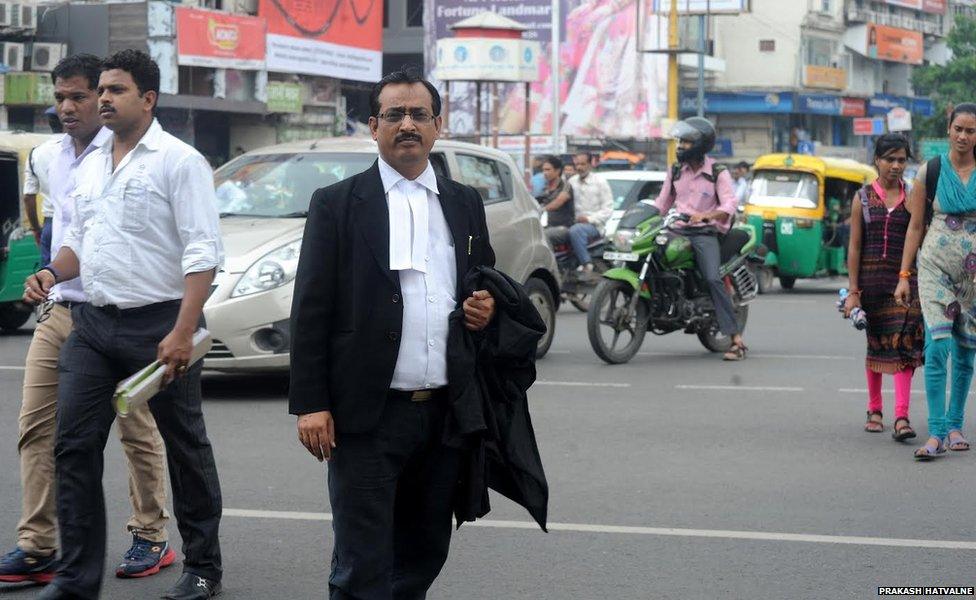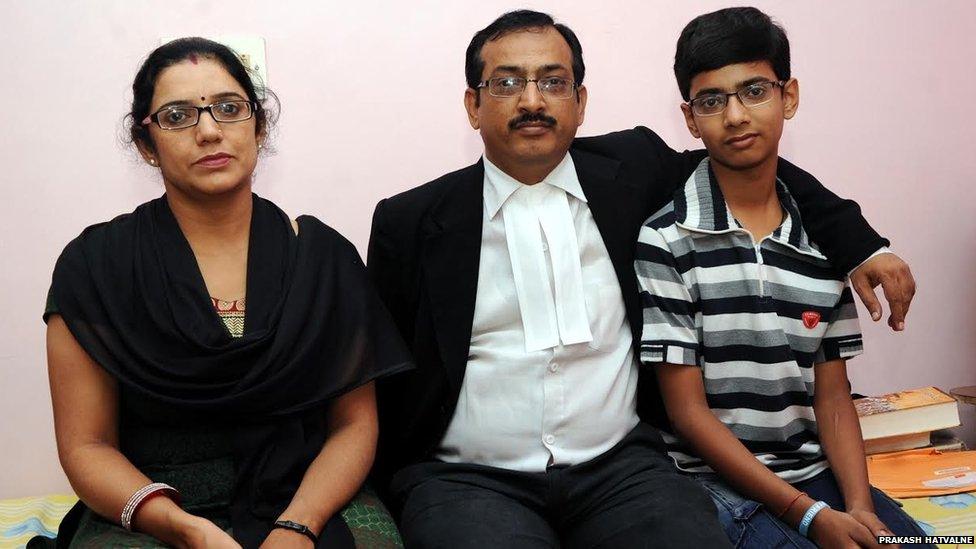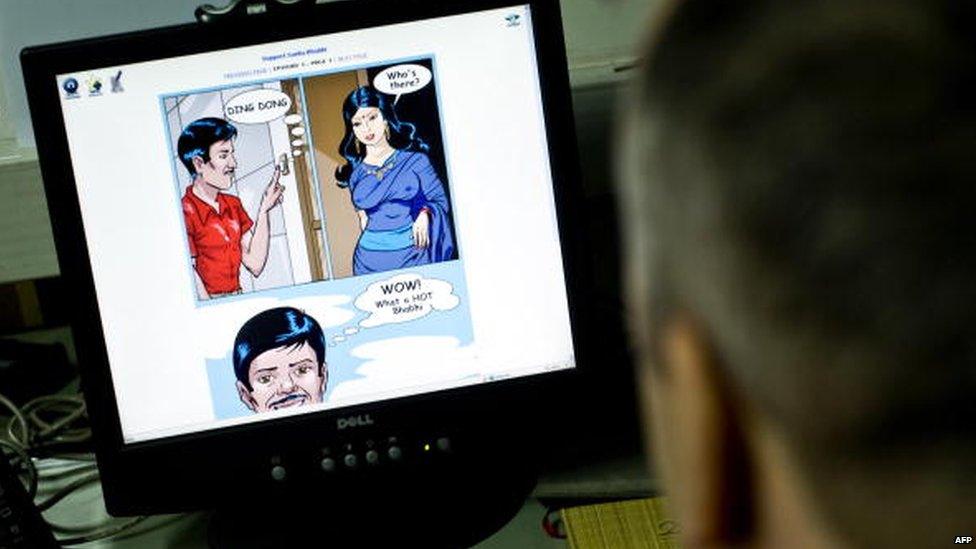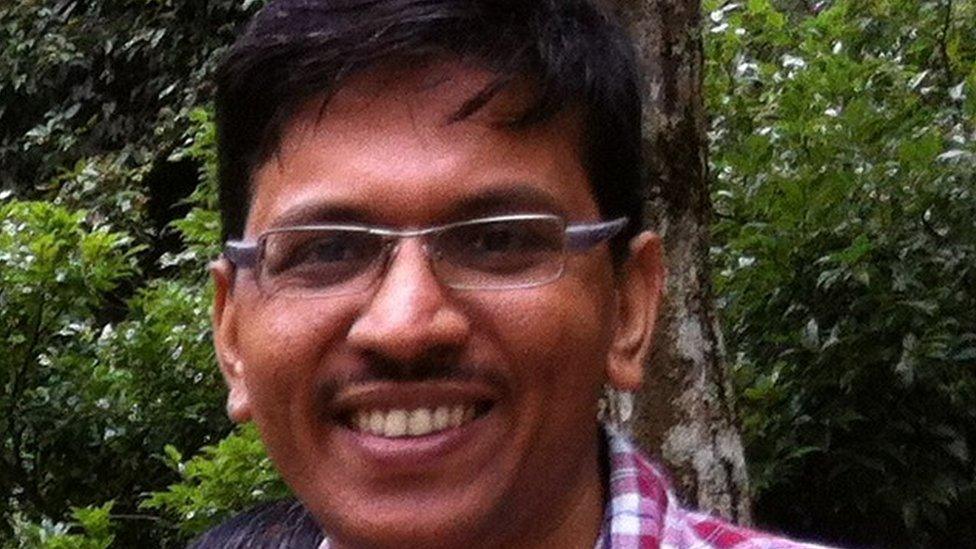The men waging war against pornography in India
- Published

Kamlesh Vaswani says pornography is a "moral cancer" which hurts India's future
On his many trips to Internet cafes in the bustling central Indian city of Indore, lawyer Kamlesh Vaswani discovered what he calls the "epidemic" of pornography.
"I would go to download important Supreme Court judgements, and pornographic adverts would pop up instead. And when I looked around, I saw rows of children surfing porn openly without a care in the world," says Mr Vaswani, 43, a quiet man with a probing look.
He says he went to the local court and discussed it with his colleagues. "They were also saying that porn was everywhere around us. Something had to be done about it."
What shook him up further, he says, was the fatal gang rape of a 23-year-old Indian student in Delhi in December 2012. The attack caused international outrage and prompted India to introduce stringent anti-rape laws.
Mr Vaswani had been in Delhi on some work on the day of the incident, and he says he felt "guilty" that he couldn't do anything to avert the crime. He believed that the attackers must have been watching porn.
Controversial plea
"Why are the youth failing India? Because they are drowning in porn," he says.
He also believes that India's GDP could be increased if people were discouraged from watching porn. "People watch porn, and become selfish. They don't want to give back to the nation," he says.
Three winters ago, Mr Vaswani began writing a public interest petition to the Supreme Court, making a controversial case for a ban on Internet porn. Confined to home to look after his ailing father, he wrote up the 200-page, 20,000-word plea on his laptop in a month's time.
The top court - to his surprise, he says - admitted the petition and heard it on April 2013.
Since then, Mr Vaswani's petition has acquired a life of its own: earlier in August, it was responsible for the government's rather ham-handed decision to block free access to 857 porn sites, which was swiftly lifted following outrage over the move. Mr Vaswani has attended nearly 20 hearings related to the case in a little more than two years.

Mr Vaswani's wife Rinki (left) is a school teacher and his son Jyotirmaya (right) is a student
The petition seeks a ban on all sites showing porn, and calls for "new, exhaustive anti-pornography laws".
Mr Vaswani's petition says that pornography is "worse than Hitler, worse than Aids, cancer or any epidemic. It is more catastrophic than nuclear holocaust, and it must be stopped".
Many would call the petition's words extreme - or paranoid. And many in India have argued against a ban on pornography - arguing that this would restrict civil liberties.
However, Mr Vaswani is adamant that pornography makes people selfish and unproductive.
His petition also argues that watching porn "puts the country's security in danger, encourages violent acts, unacceptable behaviour in society, exploitation of children and lowers the dignity of women".

Mr Vaswani's efforts led the government to temporarily ban access to hundreds of sites
Mr Vaswani, the son of a government worker and a homemaker mother, grew up in a middle-class joint family. He went to two schools, including a convent.
He says he failed to clear the highly competitive medical examinations five times, dashing his hopes of becoming a doctor. He then moved between various career choices: he picked up a degree in science, wanted to pick up one in arts, and then settled for a career in law. He has been a practising lawyer for more than a decade now.
I met Mr Vaswani at his home in Indore, an unkempt city, bristling with shops and lawyers.
He lives with his teacher wife and his school-going son in an austere two-bedroom apartment in a grotty, 35-year-old multi-storeyed building. The pale pink walls of the sitting room were adorned with a religious painting and another of his guru, while a book on criminal law and the Hindu holy book Bhagvad Gita lay on a small bed flanked by a TV set.
Fellow travellers
Mr Vaswani describes himself as "an ordinary lawyer".
"I am grateful to the top court for admitting my petition. My next public interest litigation will demand cheap and affordable treatment for cancer," he says. It is a tribute to his father who died of cancer last year.
Mr Vaswani has been joined by some fellow travellers in his journey to banish porn.
One of them is Atul Gupta, a 40-year-old electronics engineer and an alumnus of the prestigious Bangalore-based Indian Institute of Science, who lives near Delhi. Mr Gupta has been going to schools and people's homes for years installing filters and blocking porn sites. Last year, after reading about Mr Vaswani's petition in the papers, he got in touch with him and offered him help, telling him that the technology was available to block sites.
"I think porn is like drugs. It needs to be banned," says Mr Gupta.
Then there is Suresh Shukla, a 37-year-old chemical engineer from top engineering school Indian Institute of Technology (IIT), who now runs a company based in the holy town of Varanasi selling anti-pornography solutions and filters.
He provided the list of 857 "high traffic, verified sites" to the government, which led to the sites being blocked briefly. The number of sites classed as porn by his company has now swelled to more than 200,000, he says.
At his company, he says, women researchers and employees "enjoy the veto power" over men, in categorising certain "non-explicit" sites like joke and cartoon sites, as porn. "This is not about Mr Vaswani, this is about a larger battle," he says.

Suresh Shukla runs a company selling pornography blocking solutions
Last week, the government told the Supreme Court at a hearing of Mr Vaswani's petition that although child pornography must be banned, "we cannot be present in everyone's bedroom", external.
Was this a setback to his campaign, I asked.
"Not at all. The government is trying to divert the issue and make it one about invasion of privacy. This is not about privacy, this is about saving India," he said, sounding confident.
"I am confident that the court will overrule objections and ban porn."
I asked him whether he was being too optimistic.
"It will happen sooner than you think," he said. "Maybe in four-five months."
- Published8 August 2015
